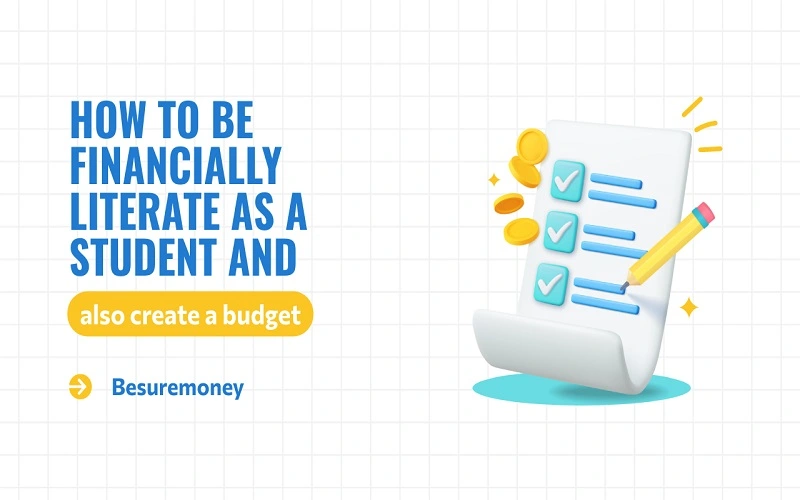How To Be Financially Literate as a Student?
Financial literacy as a student is an essential skill for everyone, but it’s especially important for students who are just starting to manage their own money. Here are some tips on how to be financially literate as a student:
How to be financially literate as a student and also create a budget?

This is the first step to understanding your income and expenses. Track your income from scholarships, grants, loans, part-time jobs, and any other sources. Then, track your expenses, such as tuition, rent, food, transportation, and entertainment. Once you know where your money is going, you can start to make adjustments to save more and spend less.
Live within your means:
It’s tempting to spend money you don’t have, especially when you have access to credit cards and student loans. But it’s important to remember that you’ll eventually have to pay back these debts, with interest. Make a plan to live within your means so you don’t end up with a lot of debt after graduation.
How To Be Financially Literate as a Student so how to start investing early?
The more advanced you begin investing, the more time your coins have to develop. Even if you could handiest store a small quantity each month, it will add up over the years.
Take advantage of student discounts:
Many agencies provide discounts to college students, so make sure to invite them. You can also save money by taking advantage of free or low-cost student activities.
Keep track of how much money you spend:
Pay interest to the way you spend your cash and perceive regions in which you may reduce back. Small changes could make a big distinction over time.
Educate yourself approximately non-public finance:
As a student of personal finance, you have access to a wealth of information. Take in information by reading. Take online guides or attend workshops.
What is the value of money?

In its National Financial Capability Study the Financial Industry Regulatory Authority (FINRA) found that Americans with higher levels of commercial literacy were more likely to Make ends meet, spend much less in their income, create a three-month emergency fund, and open a retirement account than people with decrease monetary literacy.
A person must have economic literacy to make educated judgments, stay out of debt, support their circle of relatives participants via those complicated decisions, and have ok earnings in retirement.
Balancing Immediate and Future Financial Goals:
Short-Term vs. Long-Term Planning:
Balancing immediate needs with long-term goals is a delicate but necessary aspect of monetary planning. Students should allocate resources effectively to meet both.
Prioritizing Objectives:
It is based on urgency and importance to ensure that students address critical needs while working towards aspirations.
Overcoming Common Pitfalls:
Impulse Spending:
Resisting the temptation of impulse spending is critical. Students should be mindful of their financial goals and make conscious choices to avoid unnecessary expenses.
Lack of Emergency Fund:
An emergency fund acts as a safety net during unforeseen circumstances. Students should prioritize building this fund to mitigate the impact of unexpected challenges.
Networking and Mentorship:

Importance of financial guidance:
Seeking advice from financial mentors or networking with professionals in the field provides valuable insights and guidance tailored to a student’s specific situation.
Building a Support System:
Creating a support system of like-minded individuals fosters an environment where students can share experiences and learn from one another.
How To Protect Your Assets?

It is important to protect your assets because it provides commercial security in case of surprising events, which include accidents, herbal disasters, or lawsuits, minimizing the monetary effect and assisting in protecting your hard-earned assets.
What are the different policies to protect your property?
Life insurance:
The maximum critical motive for buying lifestyles it’s far to offer economic safety to named beneficiaries on the occasion of the policyholder’s death.
You can also develop life strategies to help achieve various goals, saving for education, and retirement, optimizing property plans, and helping enterprise succession plans.
Disability insurance:
It is also known as income protection or disability income commercial, it is a type of insurance that gives economic safety on the occasion that you are not able to paint because of a disability.
It can help you pay for your bills and living expenses if you are unable to work due to a short-term or long-term disability. It can also help you pay for medical expenses, rehabilitation costs, and other costs associated with your disability.
What are the fundamental sorts of incapacity insurance?
- Short-term disability allowance typically provides benefits for up to six months.
- Long-term disability guarantee typically provides benefits for up to five years or the rest of your life.
- Disability can be purchased through an employer, a coverage agent, or online.
Conclusion
In conclusion, for students to be financially literate, it’s crucial to prioritize budgeting, saving, and understanding basic concepts. Developing smart spending habits, setting financial goals, and seeking guidance when needed will empower students to make informed and responsible decisions, setting a foundation for a secure future.
FAQs
Q1. How much life insurance do we need?
Ans: The amount of coverage depends on various factors, including your financial obligations, dependents, and future expenses. It’s advisable to assess your unique situation to determine an appropriate coverage amount.
Q2. How does a period policy vary from a comprehensive lifestyle policy?
Ans: The primary distinction lies in the duration of coverage. Term life provides coverage for a specific term, while whole life offers coverage for the entire lifetime of the insured.
Q3. Can I purchase life insurance without a scientific exam?
Ans: Yes, some policies, known as no-exam life insurance, offer coverage without a medical examination. However, these policies often come with certain limitations and may be more expensive.
Q4. How regularly ought I assess my lifestyle coverage policy?
Ans: Regular reviews are essential, especially after significant life events such as marriage, birth, or changes in financial status. It’s recommended to review your policy annually to ensure it aligns with your current needs.






